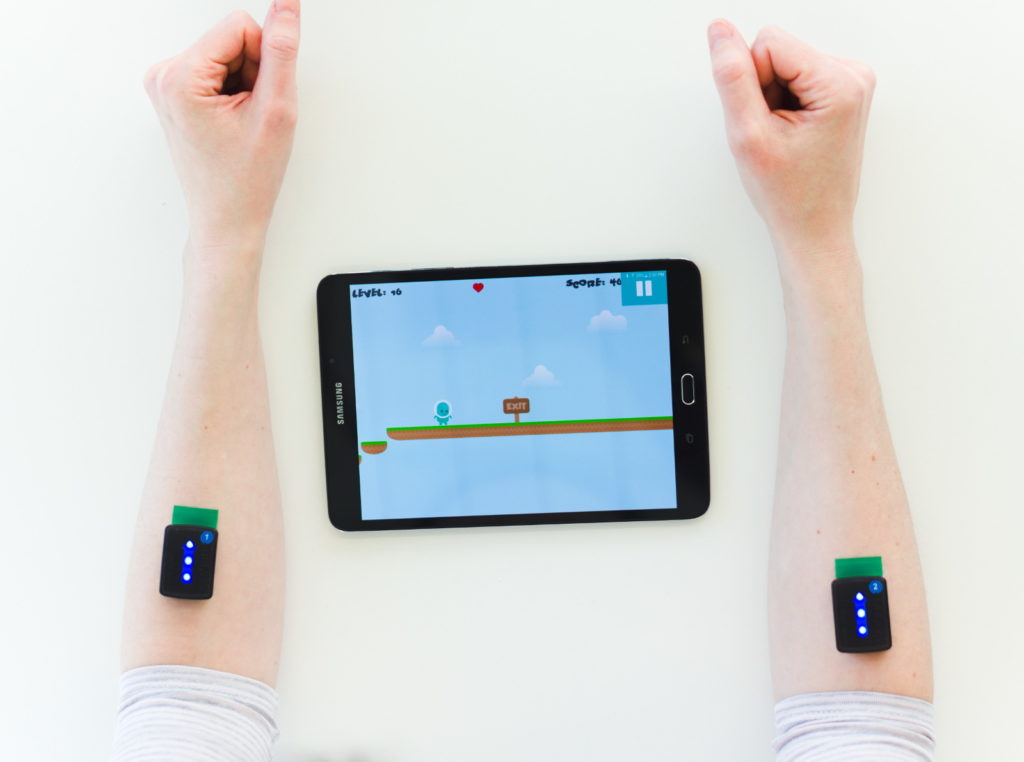
Ghostly is our award-winning EMG-controlled rehabilitation Game. I worked with my colleagues on this game that won the 2019 De Luca Foundation prize. It was a lot of fun and we released the source code on Github within the OpenFeasyo platfom. Feel free to try it out and give me any feedback you have.
‘Ghostly’ is an Android rehabilitation game for patients suffering from motor and neuro-muscular disorders. In the game’s challenging and rewarding game scenarios, Ghostly – the game character – is controlled by muscle activity of the patient that is sensed by the Delsys Trigno Avanti Sensors and interpreted by the game software. The actions of the patient thus have a direct influence on Ghostly game’s success.
A key concept of this muscular sensing approach is that each game developed and offered here on OpenFeasyo is flexible to be controlled by a variety of muscles in a variety of ways. This broadens the rehabilitation goals from these sensor games and the applicability of OpenFeasyo as a platform to a variety of use cases.
Ghostly is a 2D platform game played from a third person perspective, inspired by old-school games such as Super Mario. Ghostly is moving forward in the game world and gains points by jumping to collect coins and shooting to kill enemies. The goal of each level is to reach the exit with the highest score possible. The difficulty and complexity of the game increase as patient advances to higher levels.
The real neat part is that if you use it with sEMG sensor, it will generate a nice report directly on device. No registrations, not server side, just a nice PDF generated on device for you to save, share or just ignore. Hopefully, our users (physiotherapist doing therapy with kids) will find it useful. I have a dream that one day it will work with plenty of other sensors, and ideally on other platforms too.
Don’t forget to try it here:

And look! They were talking about it in the news:
A gaming app developed by a team of researchers at the Free University of Brussels (VUB) has proved useful for patients, particularly children, suffering from motor or neuro-muscular problems. The team led by Professor Bart Jansen, won this year’s Development Competition organised by the De Luca Foundation in the US.
The Brussels Times
“Ghostly laat ons toe om heel specifieke en verschillende spieren op diverse, maar zeer effectieve manieren te trainen. Patiënten kunnen enkel spelen als ze die welbepaalde spier gebruiken. Daarnaast is zo’n spel een leuke en uitdagende manier om te revalideren”, vertelt VUB-professor Bart Jansen.
Het Nieuwsblad
Een team van wetenschappers van de Vrije Universiteit Brussel heeft een smartphonespel ontwikkeld dat patiënten van spierziektes helpt om te revalideren. Met de gamingapp “Ghostly” kunnen patiënten het gamepersonage alleen doen bewegen door specifieke spieren in hun lichaam te gebruiken.
Medi-Sfeer
